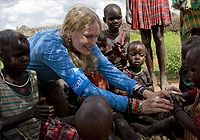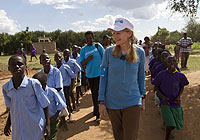 "The President [President Museveni of Uganda] was running a little late," said Mia Farrow via telephone. "So one of the children requested Shakira be put on. Everybody started dancing -- seeing the kids in their national dress and dancing and respecting each other... it gives me hope," was how Farrow began to describe the atmosphere of the first ever African Youth Forum (AYF), hosted by UNICEF, in Entebbe, Uganda, from July 17-19th.
"The President [President Museveni of Uganda] was running a little late," said Mia Farrow via telephone. "So one of the children requested Shakira be put on. Everybody started dancing -- seeing the kids in their national dress and dancing and respecting each other... it gives me hope," was how Farrow began to describe the atmosphere of the first ever African Youth Forum (AYF), hosted by UNICEF, in Entebbe, Uganda, from July 17-19th.
The theme of the historic forum, developed by UNICEF, was "Maternal, Infant and Child Health and Development in Africa." Comprised of 124 delegates, ages 16-29, from 56 countries -- it is providing hope and opportunity for international discussion in a country that's known for unrelenting devastation. Farrow, a social activist, actress, and a UNICEF Goodwill Ambassador since 2000, is in Uganda right now journeying to Gulu, Kotido, and Entebbe (giving opening remarks at the AYF).
"It's exhilarating to be among [the children]," Farrow said.
"To see them being acknowledged. A bunch of great bright, motivated young people, full of dreams and ideals and ideas... The fact that they are here and engaged in dialogue about health, development, education, and opportunities for the future, peaceful resolutions, visions for better a country, and continent... They are very aware they are representing the people in their country who don't have a voice. [At this forum] they are given a voice and they are using it," pausing to laugh a little, noting she'd used the word already, Farrow added, "It really is exhilarating."
The exhilaration does not end with the forum; for at its conclusion the African Union Summit begins, and selected youth representatives from AYF will present their ideas to their leaders. But amidst all of this hope and forward thinking, myriad tragedies and dire circumstances are all too real.
I met with a girl [in Gulu, a northern region of Uganda] who had been abducted when she was eight [by the Lord's Resistance Army]... She was forced to marry a commander -- bore two children, and is now back with her mother, a wonderful mother who has been accepting... but the issue is, what if the mother had been killed? The kids who were abducted, those children who were born in the bush, forced to fight, those children who were forced to marry or have sex with commanders and members of the LRA -- are not the only victims. Everyone in that region had to flee their homes.
The problem, Farrow continued to explain, is although the LRA has left the region, and there is political peace, there is not peace of mind. Having spent many years in camps that have now been abruptly closed, people of all ages are finding it difficult to put their lives together again, to recreate communities and build complete infrastructures.
Thus, Farrow commends UNICEF, and the Ugandan regional directors for thinking outside the box, and hosting the AYF in Uganda. She believes that giving kids a voice, and allowing them to formulate options for the future, is exactly what Uganda and the continent needs, so that the younger African generations have something to celebrate going forward.
Elhadj As Sy, UNICEF Regional Director for Eastern and Southern Africa, opened the forum on Saturday morning by saying:
Children, adolescents and young adults under the age of 25 together represent 62 per cent of the overall African population. You are actually the majority, that's why you and your concerns and voices matter so much. We need you to build our today and our tomorrow.
In Eastern and Southern Africa, the region where I work, nearly 60 per cent of all children are born without the support of a skilled birth attendant. On average, every five minutes a woman dies because of complications related to pregnancy or birth. And when a mother dies, the child has very limited chances to survive. Overall, still one out of every seven children born in sub-Saharan Africa does not survive until their fifth birthday.
The forum, on the heels of the recent G8 summit in Canada, seeks to involve youth in making the Millennium Development Goals achievable. It comes a week before the African Union Summit, in which prominent African leaders will meet to discuss the future of the continent, as well as discussing the Millennium Development Goals.

Farrow, who finds the event "so uniquely promising, and so important," hopes that going forward there will be more forums, both in and outside of Africa, especially in areas of conflict like the Middle East. To gather bright and diverse "young people, who have better ideas than the old people... To talk, and form these relationships at a young age is just crucial -- it fixes stereotypes, prejudices, and negative things that come with nationalism."
In the interim, adapting to an ever-changing modern world, UNICEF and other groups are utilizing social media. The forum is being streamed live on USTREAM, Facebook has a group and open discussions, SPEAK Africa also has a continual discussions and of course UNICEF has a live stream and press releases on their website... so that people who have the resources to watch and participate via the web can have a voice in the future as well.
"While kids in America grumble about going to school, kids here want it," Farrow said, after I voiced my opinion of apathy in many of America's youth.
The youth forum is the story, but there is a longing for education. I have been in central areas where people have fled into the bush, where they dare not construct huts next to each other for fear of being raided, and still the children and parents, and that region's UNICEF, set up schools -- a matter of four poles and a thatched roof, kids sitting on logs... The hunger for education, for parents to want a better life, is organic to human beings... hunger for knowledge is part of human need.
Farrow commends UNICEF's work, but acknowledges more help is needed. "The craving for knowledge is there. UNICEF is all about health and education for children, but getting it there and setting it up is difficult." Farrow mentioned a young man she'd met in Darfur who pointed to distant hills far away, and said, "I would walk to those mountains and back if I could get an education and find a teacher."
Farrow stressed her understanding that not all Americans are in a place where donating or volunteering is a reality, but for those who can donate, those who can come and spend time... proper outlets to help can always be found.
Our biggest enemy is our own feeling of helplessness... With knowledge comes responsibility. If people know that human beings here are in need and so hunger for so many things, not items, but education or love... maybe they will find a way.
Whether it be for a year post grad, a month annually, or in a moment of divine inspiration, much like Irene Gleeson, outlets can be found.
In 1991, Irene Gleeson, a native of Sydney, Australia, a mother, and now a grandmother, waited for her youngest child to turn 21, and then felt the inclination to help. She sold her belongings, bought a caravan (a trailer) and said to herself, "Where is the conflict, where can I be of help?" Loading her trailer onto a boat she traveled to Uganda, where she set up under a tree and began taking in kids. Everyday more than 8000 children attend her schools, and she has helped countless others. "She's one of the most joyous women you can ever meet... teaching the kids to trade guns in for musical instruments... She's been living hand to mouth, and they've managed since 1991." Farrow met Gleeson while touring Uganda, and is hoping to find a way to get computers to Gleeson's students. "That's incredible," I said. "Isn't it!" Farrow's voice rose. "Isn't it just great!"
"You have to have hope," Farrow continued:
We have to be believe the [Millennium Development Goals] are achievable. It's not a political situation... In Uganda 500 children die every day. The young people know about evil, and anguish, and loss, and they are all about building and hope and finding resolutions... If you don't have hope what is the point of all of this?
Farrow paused and apologized. She said that children had gathered around her and were dancing, celebrating.
"You know," Farrow said after another moment. "A funny thing happened... my very first trip for UNICEF was across Nigeria..." While there she met a young boy of 13, Emmanuel. At the conference on Saturday, "someone came up to me... I hadn't recognized him. It was Emmanuel. He's one of the youth leaders representing Nigeria! He was an amazing kid then, and now, moving forward full steam ahead." Emmanuel, Gleeson, UNICEF, Farrow, volunteers, and the children at the AYF are the proof that hope, in the hands of motivated minds, springs eternal, and into action.
*Photos: © UNICEF/NYHQ2010-1408/Hofer